Link
This video puts into context the current #selfieculture in an extreme and shocking way- it is not easy to watch. In doing so, it also underpins respect, culture and education, something we should never strive to lose or stop learning about.
***WARNING: This video contains graphic images***
3 notes
·
View notes
Photo

Want to know an equivalent social media site in China?
Thanks to: https://informationstrategyrsm.wordpress.com/2013/10/02/the-great-firewall-of-china/
13 notes
·
View notes
Link
Would your business/company/employer website be banned in China? This link will tell you!
1 note
·
View note
Text
The Chinese have no Facebook!
CHINESE CITIZENS HAVE NO FACEBOOK!!! How on earth will they survive?!
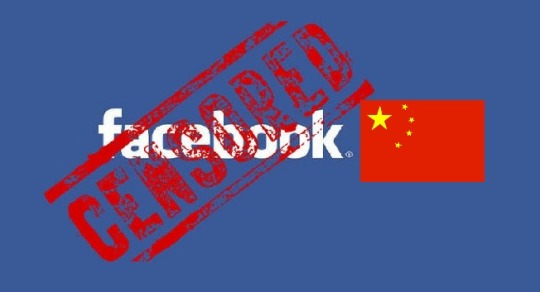
(Facebook Censored China 2014 http://www.echinacities.com/china-media/A-Pipe-Dream-Facebooks-Ambitions-in-China)
Quite well, in fact.
Most of us know about the “Great Firewall of China”- a well thought out plan by the Chinese government to block any websites that they deem are sensitive or threatening (Open Democracy 2013). That means (and is in no way limited to) no Facebook, no twitter, no Instagram, no Linkedin, no YouTube, no Tumblr! (This link is great to see which sites are blocked and which are allowed.) There is no doubt that if Chinese citizens want to access this information, there are ways and means of doing so. They have also come up with ingenious plans and alternative languages to pass on sensitive information and make their thoughts and feelings felt. There is plenty of info about this online if one wants to enlighten themselves. This post however, focuses on social media and the pages that Chinese citizens- referred to as ‘Netizens’- are using as an alternative to what we identify as traditional social media sites.
Worldwide, there are almost 3.5 billion internet users (statista 2016). Almost 700 million of these users are netizens in China (Lee 2016). It is a huge market. Huge. So what do the government do to traditional social media sites used by the rest of the world? They “block and clone” (TED 2012). Chinese social media copycat sites are insanely popular, some with better features than the sites we are used to! The sites on the left of the below screen snip have been blocked and replaced with the sites on the right:
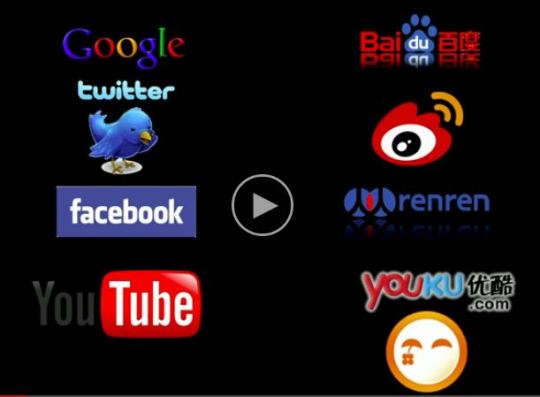
(3:49 still from Behind the Great Firewall of China, 2012, http://www.ted.com/talks/michael_anti_behind_the_great_firewall_of_china)
Think of our twitter- 140 characters to say what we want to say. The Chinese equivalent, Weibo has the same volume, however because Chinese characters are equivalent to over 3 times that in English, the site is technically considered a microblog site. In addition to this, features are more simplistic, with the ability to post photos, videos, comment on posts and a much easier way of reposting. Twitter could get some tips from Weibo!
Facebook has many equivalents in China. Audiences are much more segmented depending on mutual likes, socio economic status, studies and more. On Douban, one can connect with others who share their cultural interests and meet up to go to a museum together. RenRen seems to be like a giant yearbook where students can share photos and videos and connect with their study peers (Crampton 2011).
Yoku and Tudou are the equivalents of YouTube. TV shows are quickly pirated with Chinese subtitles and shared on here, contributors are more like TV stations and clips are often professionally produced (Crampton 2011).
It is highly unlikely given their alternative choices that Chinese netizens are crying into their pillows about not having access to Facebook...
References
Crampton, T 2011, 'Social media in China: The same, but different’, China Business Review, Vol. 38, no. 1, pp. 28-31, viewed 28 January 2017, <http://www.thomascrampton.com/china/social-media-china-business-review/>.
‘Facebook-Censored-China’ [image], in echinacities.com 2014, A pipe dream? Facebook’s ambitions in China, viewed 28 January 2017, <http://www.echinacities.com/china-media/A-Pipe-Dream-Facebooks-Ambitions-in-China>.
Greatfirewallofchina 2014, viewed 26 January 2017, <http://www.greatfirewallofchina.org/>.
Lee, M 2016, ‘China's Nearly 700 Million Internet Users Are Hot For Online Finance’, Forbes, viewed 29 January 2017, <http://www.forbes.com/sites/melanieleest/2016/01/25/chinas-nearly-700-million-internet-users-are-hot-for-online-finance/#4448cd941391>.
Number of internet users worldwide from 2005 to 2016 (in millions) 2016, Statista, viewed 29 January 2017, <https://www.statista.com/statistics/273018/number-of-internet-users-worldwide/>.
TED 2012, Behind the Great Firewall of China, June, viewed 26 January 2017 , <http://www.ted.com/talks/michael_anti_behind_the_great_firewall_of_china>.
The Great Firewall of China 2013, Open Democracy, viewed 26 January 2017, <https://www.opendemocracy.net/china-correspondent/great-firewall-of-china>.
3 notes
·
View notes
Text
Are you game?
Gaming is “the act of playing games”.
Thanks, Wikipedia for your insightful definition. #NotARealSource
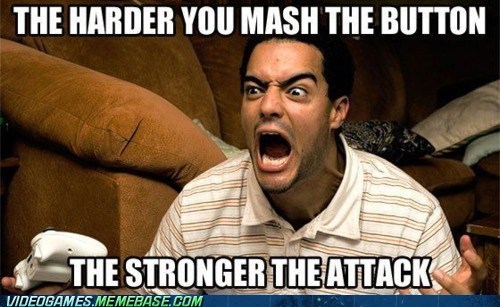
(Favourite Video Game Memes, 2014, https://duality587.wordpress.com/2014/05/30/favourite-video-game-memes/)
In reality, it is rarely that simplistic.
Gaming could include Monopoly, chess, table tennis or hopscotch! However, in this context, gaming will refer to games played online. These games can be loosely categorised into a number of different ‘types’ (including, but not limited to);
· Massively Multiplayer Online (MMO)/ Massively multiple online role-playing games (MMORPG)
· Simulations
· Adventure
· Real-Time Strategy (RTS)
· Puzzle
· Action
· Stealth Shooter
· Combat
· First Person Shooters (FPS)
· Sports
· Role-Playing (RPG)
· Educational
(Jane Hurst 2015)
Within this group, you have the ever emerging and impactful world of social network games, such as those accessed through Facebook. These games- often free (with the exception of in-app purchases)- can be played against family and friends without everyone being online at the same time. Addictive, suitable for short play periods and easy to use, games such as Farmville and Candy Crush are frequently seen in social media threads.
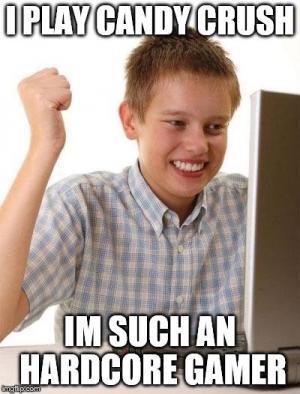
(Funny Captions n.d, http://www.funnycaptions.com/tag/candy-crush-meme/)
However, the notion of community, social constructs and morality are being put to the test by MMORPG’s such as EVE online- a futuristic space combat game where alliances are formed to defeat enemies and communities work together to survive. Overseen by “tick the box” rules which are often “insufficient... on which to base governance rules that have an important impact on the lives of participants” (Suzor & Woodford 2013, p. 3), EVE online faces constant challenges between what is considered moral, whether this boundary can be pushed because it is part of ‘standard game-play’ and how to effectively govern players whilst maintaining the integrity of the game. In addition to this, challenges arise from governance outside of game boundaries, such as “social media, fan forums, modding, fan fiction, conventions and cosplay” (de Zwart & Humphreys 2014, p. 95). It begs the question of when the game stops being just a game...
In addition to EVE online, other online games such as World of Warcraft (WoW)- where players learn skills and complete group tasks as they make their way through a fantasy world (I am definitely a non gamer, be kind to me!)- have been studied in relation to interpersonal friendships that have been established. In one study titled “A Qualitative Analysis of Online Gaming: Social Interaction, Community, and Game Design” (Hussain & Griffiths 2014), the research identified that “social interaction and social networking in-game has the capability to foster better social relationships amongst gamers and consequently prevent social and possible mental health problems associated with loneliness and lack of social interaction” (p. 54). Participants spoke of learning life skills, multitasking, working as a team, increased self confidence and decreased feelings of loneliness playing these games.
Of course, all of these can lead into discussions about the more negative aspects of online gaming but that is reserved for another day.
In the meantime? Game on!
References
‘candy crush meme’ [image] in Funny Captions n.d., Candy Crush Meme, viewed 26 January 2017, <http://www.funnycaptions.com/tag/candy-crush-meme/>.
de Zwart, M & Humphreys, S 2014,' The Lawless Frontier of Deep Space: Code as Law in EVE Online', Cultural Studies Review, vol. 20, no. 1, pp. 77-99.
Gaming 2017, Wikipedia, viewed 26 January 2017, <https://en.wikipedia.org/wiki/Gaming>.
Hurst J 2015, 12 Types Of Computer Games Every Gamer Should Know About, Thought Catalog, viewed 26 January 2017, <http://thoughtcatalog.com/jane-hurst/2015/02/12-types-of-computer-games-every-gamer-should-know-about/>.
Hussain Z& Griffiths M 2014, ‘A Qualitative Analysis of Online Gaming: Social Interaction, Community, and Game Design’, International Journal of Cyber Behavior, Psychology and Learning, vol.4, pp. 41-57, April-June 2014, viewed 26 January 2017, <http://go.galegroup.com.ezproxy.lib.swin.edu.au/ps/retrieve.do?tabID=T002&resultListType=RESULT_LIST&searchResultsType=SingleTab&searchType=AdvancedSearchForm¤tPosition=1&docId=GALE%7CA425773228&docType=Article&sort=RELEVANCE&contentSegment=&prodId=AONE&contentSet=GALE%7CA425773228&searchId=R1&userGroupName=swinburne1&inPS=true>.
Suzor, N & Woodford, D 2013, 'Evaluating consent and legitimacy amongst shifting community norms: An EVE Online case study', Journal of Virtual Worlds Research, vol. 6, no. 3, pp. 1-14.
‘video-game-memes-context-sensitive’ [image], in Duality 587 2014, Favourite Video Game Memes, viewed 26 January 2017, <https://duality587.wordpress.com/2014/05/30/favourite-video-game-memes/>.
3 notes
·
View notes
Link
A very interesting experiment on what different countries consider to be the “ideal” female form.
#what perfect woman looks like world designers photoshop model beauty ideals differ country#mda20009
1 note
·
View note
Photo

No. Just no.
(Selfies Gone Wrong 2017 http://runt-of-the-web.com/selfies-gone-wrong#15)
1 note
·
View note
Text
Hello? Is it ME you’re looking for?
I (yes me, busy person) am going to buck the trend.
This will be a first person post.
I’ll throw some academia in here somewhere (cause you know, Uni) as it will make me seem smarter. Or will it? Are things always what they seem? Hello? Is it ME you’re looking for?
This is me. (hello)

Just your average, everyday, working, studying mum. Take a good look. I don’t stand out in a crowd (unless I am wearing heels) and I don’t really want to. And what you see is really what you get. I am NOT one of the 68% of people who edit selfies before posting them to social media (Ottke 2015). Although if I wanted to, a quick google could give me over 700,000 options for perfecting the art. And it really is an art!
We live in an age of sharing. Where “platforms and services specifically designed for the networked sharing of user-created content” (Vivienne & Burgess 2013, pp. 281) form part of our daily lives. And for some, the creation of that content matters. A lot.
So I decided to delve into that world. Just for a little bit. I approached a friend who is a prolific touch-up queen and asked her to have a bit of a play with my photo. Her first question? “How 'done' do you want to go??? Because these apps can do ANYTHING”. I told her that I wanted “enough to notice a change but not so over the top that I look like a mannequin”.
Want to see the end result? (stupid question)

Here I am! Whitened teeth, refined cheekbones, even complexion, a slightly more awake look... But I don’t think I look like ME- she even gave me some dental work! This is my friends’ perception of how a photo should be touched up- to the extent of NOT looking like a mannequin... (I could debate that) I am happy with the way I look, but what if I had a low self esteem? Would I question my looks based on what someone else perceives as attractive?
I think that is the issue. It is all around us- what others perceptions of attractiveness or beauty are. Even celebrities are not immune:
youtube
(10 Celebrity Instagram Photoshop Scandals, 2015, https://www.youtube.com/watch?v=tYzWe-VkqGI)
Almost 6.5 million people have watched this video of celebrity photoshop fails. Instead of being a light-hearted view of photo editing, some of the comments were concerning:
- At the 51 second mark of the video, a comment is made about Kim Kardashian; “But when posting for millions of followers, who could blame her for wanting a trim waistline?”
- At the 2 minute, 10 second mark, a comment about Phaedra Parks; “But who wouldn't want to look their best when posing next to a huge star like Nicki Minaj?”
These subtle comments are extraordinarily dangerous. To the young, the at risk, the naive, it could be seen as a message that if celebrities aren’t perfect, what chance do they have? Again, we are subjected to someone elses ideals of what beauty is. Comparisons, assumptions- one could go as far as to put the comments into the realm of body shaming.
Education here is key. Education that different people have different opinions on what is considered attractive, education that the notion of perfection is unattainable if you are only looking at aesthetics and education that “edits/manipulations... selectively reveal/conceal aspects of identity” (Vivienne & Burgess 2013, pp. 286) when looking at imagery that is presented to us online, in print and on TV on a daily basis.
And just in case you are wondering, no editing apps have been added to my phone.
References
Ottke 2015, 68 Percent of Adults Edit Their Selfies Before Sharing Them With Anyone, fstoppers, viewed 16 January 2017, <https://fstoppers.com/mobile/68-percent-adults-edit-their-selfies-sharing-them-anyone-95417>.
Vivienne, S & Burgess, J 2013, ‘The Remediation of the Personal Photograph’, Journal of Material Culture, vol. 18, no. 3, pp. 279-98.
The Talko 2015, 10 Celebrity Instagram Photoshop Scandals, 12 October, viewed 16 January 2017, <https://www.youtube.com/watch?v=tYzWe-VkqGI>.
16 notes
·
View notes
Link
Let your mates know you are okay in a time of crisis
2 notes
·
View notes
Text
Social Media in times of crisis- chasing ones tail.
How do you usually find out about something newsworthy- a terrorist attack, a natural disaster, Amy Schumer cancelling her Australian tour...?
It would be surprising if most DIDN’T answer “social media”.
With information coming in thick and fast, how do we know what we are seeing is correct? Who is posting and why? Are their motives genuine?
When Paris was targeted in simultaneous attacks at Stade de France, Le Carillon Bar, Le Petit Cambodge restaurant, La Belle Equipe bar and Bataclan concert hall, social media provided up to the minute information; “Many posted without the realisation that words written in seconds would have a legacy.” (BBC 2015).

(BBC, 2015, http://www.bbc.com/news/blogs-trending-34836214)
(Translation: "Explosion in the Stade de France? Was it a bomb or was it harmless? Explosion today here in France, in the stadium.")
Johannes Muller posted the above on twitter 1 minute before the media outlets started reporting. Note his first suspicions that it was a bomb. What came after was a series of images, videos and information about the attacks, from citizen journalists, media outlets and emergency services. We refer to this collectively as crowdsourcing in a time of crisis. Much of this information is useful, but other information is misleading, inaccurate or dangerous.
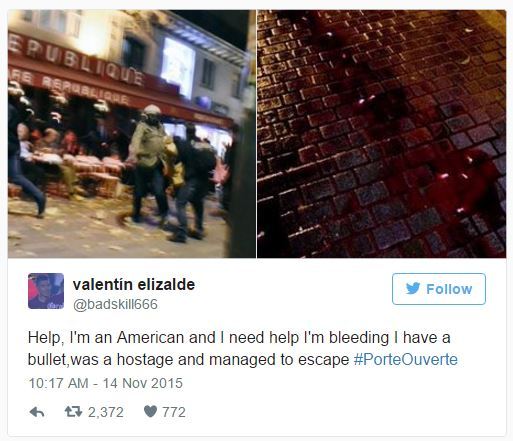
(The Star, 2015, https://www.thestar.com/news/world/2015/11/16/10-things-social-media-got-wrong-about-the-paris-attacks.html)
The above twitter post was a hoax. But those responding in a time of crisis attempted to assist nonetheless, wasting valuable time and resources.
Crowdsourcing in a time of crisis can offer a lot of positive benefits:
-Places to seek shelter
-Information about contacting loved ones
-Providing emergency assistance information
-Sharing information from emergency services
-Information about volunteering/donating/vigils
But when it comes to citizen journalism, one should also tread carefully.
Media.com is a website that shares stories and articles- one such article, titled ‘Social media during terrorist attacks: How useful is it for journalists?” by Nicolas Magand (2016), outlines a round table discussion about journalism and social media after the Nice, France attack. In the article, he refers to a list of guidelines that journalists should adhere to when posting via social media in times where everything is heightened. Most of these also apply to citizen journalists, when thinking about their contribution to crowdsourcing of information:
“Key social media lessons during a terrorist attack:
Promoting safety should be the number one priority
Verify information before sharing it, use social media as a source but go back to fundamentals of journalism
Use editorial judgment to make a decision on what to show and share
Answer questions, interact with the readers, explain the information”
Remember- once something is on social media, there is a link to it forever- even if it gets deleted. Don’t chase your tail, offering corrections or explanations. Get your information right, don’t make assumptions, give credit if the info isn’t yours, don’t share something that you shouldn’t and ask yourself if you would want the information shared if the tables were turned.
References
BBC 2015, ‘How the Paris attacks unfolded on social media’, BBC News Services, 17 November, viewed 9 January 2017, <http://www.bbc.com/news/blogs-trending-34836214>.
Magand M 2016, Social media during terrorist attacks: How useful is it for journalists?, Medium.com, viewed 9 January 2017, <https://medium.com/global-editors-network/social-media-during-terrorist-attacks-how-useful-is-it-for-journalists-fbb6d4522a3b#.fj5bdueyj>.
The Star 2015, ‘10 things social media got wrong about the Paris attacks’, Toronto Star Newspaper, 16 November, viewed 9 January 2017, <https://www.thestar.com/news/world/2015/11/16/10-things-social-media-got-wrong-about-the-paris-attacks.html>.
6 notes
·
View notes
Text
Just TROLL with it
TROLL: “In Scandinavian mythology, trolls are creatures who look like ugly people. They live in caves or on mountains and steal children” (Collins Dictionary 2017).
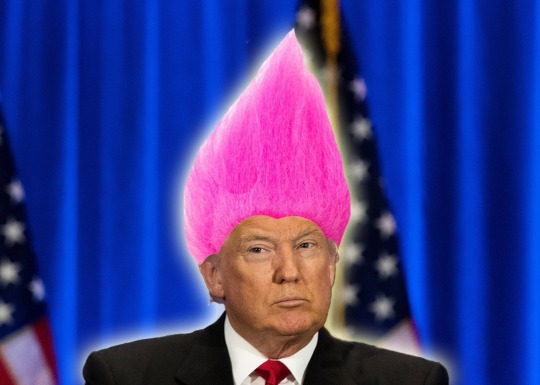
(Donald Trump is not a Troll 2016, http://www.slate.com/articles/technology/future_tense/2016/06/the_problems_with_calling_donald_trump_a_troll.html)
Whoops, wrong troll...
TROLL: “To post deliberately inflammatory articles on an internet discussion board” (Collins Dictionary 2017).
That’s more like it!
Unless you are living in a hole, you would have seen a troll in action on the net- either targeting you directly or targeting someone else. Trolls can be intelligent or senseless, funny or nasty, sly or straightforward. “They purposely post inflammatory statements, not as a way to bully or harass other people, but to watch the reactions” (eSafety n.d.).
Celebrities are huge targets for trolls. Often, they can make light of it:
youtube
(Mean Tweets- Music Edition #3, 2016, (https://www.youtube.com/watch?v=4Y8bUT8UXUA&index=4&list=PLs4hTtftqnlAkiQNdWn6bbKUr-P1wuSm0)
But at other times it really affects them:

(Yahoo7 Be 2016, https://au.be.yahoo.com/entertainment/celebrity/a/32028236/sam-frost-emotional-talk-on-trolls/#page1)
Sam Frost- star of The Bachelor and The Bachelorette was hounded mercilessly about her weight, her appearance, and other aspects of her life, from multiple fake profiles. It affected her so much that she contemplated self harm and removing herself from public life altogether: “I don’t want to be here anymore. I said I don’t want to wake up every day anymore” (Norton 2016). With the consistence of counselling, she has been able to work through her depression and move forward.
But what about those who are not in the public eye? Who may not be able to receive support for what they are experiencing?
The Office of the Children’s eSafety Commissioner recommends the following steps to protect ones self against trolls:
Ignore the troll. Don't respond to nasty, immature or offensive comments—giving trolls the attention they want only gives them more power.
Block the troll. Take away their power by blocking them and if they pop up under a different name, block them again.
Report trolls to website administrators and if they appear again under a different name, report them again.
Likewise, when online, it is important to think about what you post and the effect it might have on others. Let’s look at a flow chart for more information:
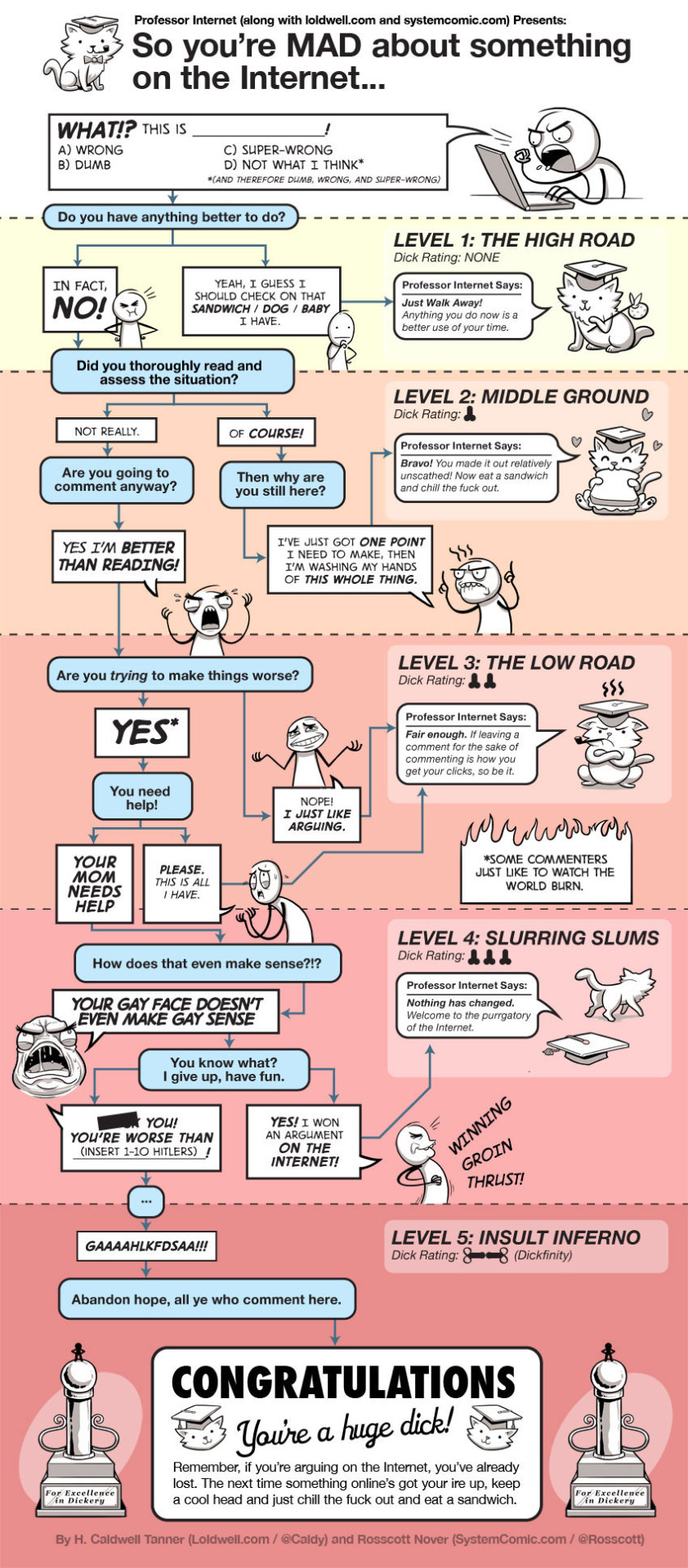
(So you’re mad about something on the internet, 2011, http://www.systemcomic.com/2011/08/03/so-youre-mad-about-something-on-the-internet/)
Common sense and courtesy should always prevail. If you wouldn't say something to someone in real life, don’t say it to them online.
References
‘Donald Trump is not a Troll’ [image], in slate.com 2016, viewed 2 January 2017, <http://www.slate.com/articles/technology/future_tense/2016/06/the_problems_with_calling_donald_trump_a_troll.html>.
Jimmy Kimmel Live 2016, Mean Tweets - Music Edition #3, 15 February, viewed 4 January 2017, <https://www.youtube.com/watch?v=4Y8bUT8UXUA&index=4&list=PLs4hTtftqnlAkiQNdWn6bbKUr-P1wuSm0>.
Norton S 2016, ‘Sam Frost gets emotional revealing why trolls broke her’, Yahoo7 Be, viewed 4 January 2017, <https://au.be.yahoo.com/entertainment/celebrity/a/32028236/sam-frost-emotional-talk-on-trolls/#page1>. (and image)
“So you’re mad about something on the internet” [image], in The System 2011, viewed 2 January 2017, <http://www.systemcomic.com/2011/08/03/so-youre-mad-about-something-on-the-internet/>.
Troll 2017, Collins Dictionary, viewed 2 January 2017, <https://www.collinsdictionary.com/dictionary/english/troll>.
Trolling n.d, eSafety.gov, viewed 2 January 2017, <https://www.esafety.gov.au/esafety-information/esafety-issues/trolling>.
10 notes
·
View notes
Link
100 different types of internet trolls. How many have you encountered??
0 notes
Photo
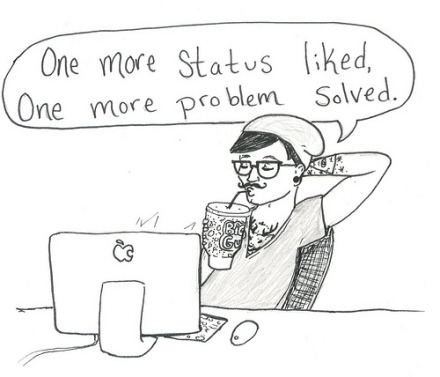
(Slacktivism 2013, https://melyssatroy.wordpress.com/tag/slacktivism/)
1 note
·
View note
Text
Click and they shall come
Have you ever:
-Changed the colour of your profile pic to support gay marriage or to the French flag to support terrorism victims?
-Shared a pic or a link to fight injustice or cancer?
-“Liked” a post about an important cause?
-Used a myriad of hashtags to support something, anything?!
What exactly are you achieving by doing this? Are you enacting or advocating for real change? Can one click really make a difference?
Lots of questions, no easy answers...
Our prolific use of social media means that there is no better place to be an activist, to support the causes we feel strongly about. Unfortunately, it is rarely that simple. Welcome to the world of slacktivism- also called clicktivism.
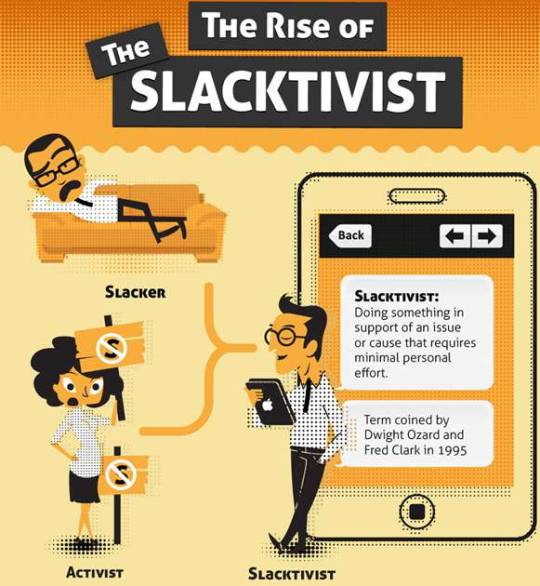
(Rise of the Slacktivist, 2015, http://therules.org/clicktivism-online-petitions/)
“Information technologies have become indispensable to reformers, revolutionaries, and contemporary democracy movements. They serve as venues for the shared expression of dissent, dissemination of information, and collective action” (Youmans & York 2012, p. 315). As long as you actually do something. To click or like something has its benefits. It can push a cultural movement, a perception, “changing social attitudes toward an entire group of people” (Dewey 2015). The importance of this cannot be disputed. However, change is most effective when it is further enacted upon.
Lets look at the example of the Ice Bucket Challenge. To raise awareness of MND (Motor Neurone Disease), participants would tip a bucket of ice over their heads, record it, post it to social media and raise money for research. Initially criticised as another example of clicktivism, the rate at which the challenge went viral was extraordinary and in Australia alone, the initiative raised over $3million (MND Australia n.d.). Everyone knew about what MND was and what the challenge was designed to achieve.
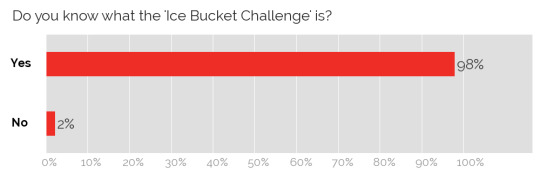
(Ice Bucket Challenge 2014)
This challenge is a great idea of slacktivism turned activism. By doing more than just clicking or sharing, people were active and the donations flowed. So next time you like, click or share, ask yourself what more you can do. Can you donate? Can you attend a rally? Can you raise funds? Can you sign a petition?
Be more than just the person behind the screen, clicking away.
References
Dewey, C 2015, Why it matters 26 million people have changed their Facebook profile picture to a rainbow flag, Independent, viewed 2 January 2017, <http://www.independent.co.uk/life-style/gadgets-and-tech/news/why-it-matters-26-million-people-have-changed-their-facebook-profile-picture-to-a-rainbow-flag-10355183.html>.
Ice Bucket Challenge, Clicktivism, Bucket Lists [image], in YouGov UK 2015, viewed 2 January 2017, <https://yougov.co.uk/news/2014/09/01/ice-bucket-challenge-clicktivism-bucket-lists/>.
Ice Bucket Challenge FAQ’s n.d., MND Australia, viewed 2 January 2017, <http://www.mndaust.asn.au/MND-Australia-archive/Ice-Bucket-Challenge-(1)/Ice-Bucket-Challenge-FAQ-s.aspx>.
‘Rise of the Slacktivist’ [image], in The Rules 2015, viewed 2 January 2017, <http://therules.org/clicktivism-online-petitions/>.
Youmans, W, & York, J 2012, 'Social Media and the Activist Toolkit: User Agreements, Corporate Interests, and the Information Infrastructure of Modern Social Movements', Journal Of Communication, vol. 62, no. 2, pp. 315-329.
1 note
·
View note
Text
#thanksobama
Barack Obama has been dubbed “the social media President” (Katz, Barris and Jain, 2013) and it is easy to see why.
youtube
(Mean Tweets- President Obama Edition, 2015, https://www.youtube.com/watch?v=RDocnbkHjhI)
Self deprecating with a sense of humour, President Obama is not afraid to embrace technology and social media to highlight the serious and not so serious aspects of campaigning and the presidency. In fact, it was a conscious effort to “draw on the power of digital engagement to tap into the wishes and talents of the American people” (Katz et al, 2013, p. 3) and social media has been the mainstay since even before his foray into presidency. He “deftly used technology to shatter fundraising records, organise supporters locally, repel attacks and get out the vote en route to a strong victory” (Katz et al, 2013, p. 16).
With over 12 million followers on twitter for his @POTUS handle and over 80 million for his personal handle, together with over 3 million on Facebook, Obama is perhaps the best example of a leader who has most effectively embraced social media as a form of engaging with constituents whilst flawlessly walking that fine line between personal and political.
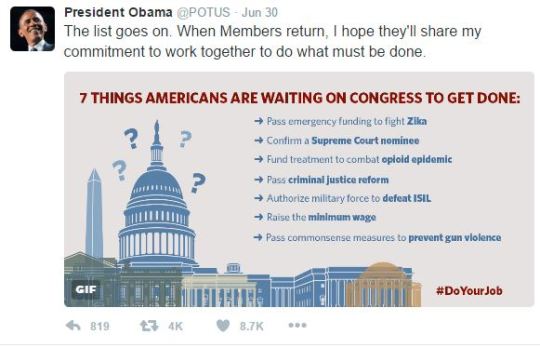
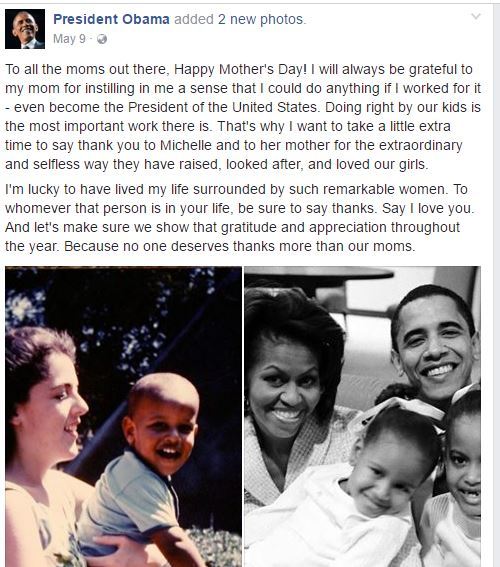
Unlike in Australia, where politicians “retreated as those online took the opportunity to tell the politicians exactly what they thought of them” (Jericho 2012, p. 256), Obama embraced opportunities to engage by replying, re-tweeting and conversing. Even when social media tapped into the negative political discourse with the hashtag #thanksobama, that was originally satirical in nature, Obama ran with it!
youtube
(Thanks Obama, 2015, https://www.youtube.com/watch?v=uhY9Zxv1-oo)
But. As we know, “social interaction can often create a bond, a feeling that there is a relationship” (Katz et al, 2013, p. 88), when in fact, there isn't one. Obama, together with his administration cultivated this well, with a combination of the personal and political but also with highly orchestrated question and answer opportunities. These sessions touted wanting to get information from the public but when looking at the discussion points, it appeared that “from among the various justifications available to it related to social media, the Administration selected those that would bolster its case for policies it wanted to pursue in the first place” (Katz et al, 2013, p. 90). Thanks Obama.
Australian politicans have a lot to learn from Barack Obama. Perhaps when he leaves the White House, he can offer his social media consulting services to the ALP or the Coalition! There is no doubt that the vote of the younger generation is going to be essential to any politician in Australia moving forward. They need to embrace social media as a way to get their message across but also convey the “everyperson” to make that connection (even if it is false). Because this is the future.
Thanks Obama!
References
Barack Obama 2016, Twitter.com, viewed 6 December 2016, <https://twitter.com/barackobama>.
Jericho, G 2012, 'How many votes are there on Twitter?', in The Rise of the Fifth Estate, Scribe, Victoria, Australia.
Jimmy Kimmel Live 2015, Mean Tweets - President Obama Edition, March 12, viewed 6 December 2016, <https://www.youtube.com/watch?v=RDocnbkHjhI>.
Katz JE, Barris M & Jain A 2013, The Social Media President, Palgrave Macmillan, New York.
Marcks B 2015, Thanks Obama, February 12, viewed 6 December 2016, <https://www.youtube.com/watch?v=uhY9Zxv1-oo>.
POTUS 2016, Twitter.com, viewed 6 December 2016, <https://twitter.com/POTUS>.
President Obama 2016, Facebook.com, viewed 6 December 2016, <https://www.facebook.com/potus/?fref=ts>.
4 notes
·
View notes
Text
The internet as a juxtaposition
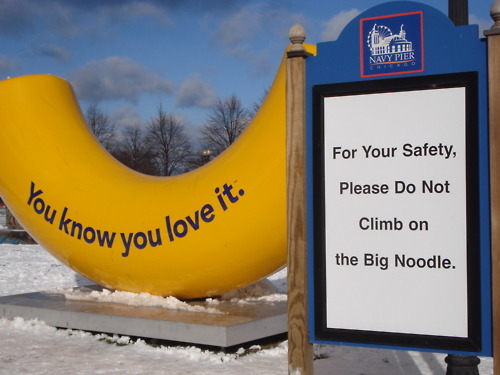
(Juxtaposition - Image #728,631 2014, http://knowyourmeme.com/photos/728631-juxtaposition)
The Oxford Dictionary defines the term ‘juxtaposition’ as “The fact of two things being seen or placed close together with contrasting effect” (2016).
With 3.5 billion (yes, BILLION) internet users in the world and 2.3 billion active social media users (We are social 2016), there are going to be some disagreements on whether all things the internet and social media are a good thing.
The increased connectivity that blurs global boundaries means that we are closer than ever in a figurative sense than ever before. danah boyd speaks of being “always on” and where “being networked to people and information wherever and whenever you need it is just assumed” (boyd 2012). For most, this appears to be our lives; not sure where you are going? Map it! No idea what that fancy term on a menu is? Google it! Got a friend overseas on a holiday? Send them a request for a photo when you can’t get back to sleep at some silly hour of the morning!
On the flip side, researchers such as RA Davis identifies that “The need for social contact and reinforcement obtained online results in an increased desire to remain in a virtual social life” (2001 p. 188) and that this may become a pathological problem. All in moderation, you might say!
But let’s continue to look at the internet in all its glory and identify just a couple of the many juxtapositions that our world wide web highlights.
In her 2012 TedTalk ‘Connected, but alone?’, Sherry Turkle comments that we use the internet to “support our fragile sense of self”. I didn't realise we were all that feeble, Sherry! I agree that we need to be able to juggle our "capacity for self-reflection" with that instant gratification. Too often we can be so absorbed in what is going on that we lose sight of what is directly around us. But not to the extent of spending "an evening on social networks instead of going to the pub with friends". Give me a pub any day!
In another TedTalk titled “How the Internet enables intimacy” (2009), Stefana Broadbent speaks of the “democratisation of intimacy” and how parenting through skype and eating dinner with extended families overseas using a computer at the dinner table enables us to increase our connection with our private sphere which is something we would previously have been unable to do!
Furthermore, discussions about what constitutes an online community also identifies contrasts.
Mark Wills refers to online communities as a “new paradigm” in his 2012 TedTalk. He refers to offline environments as “pretty simple” as most interaction takes place face to face. His comment that being online means that you don’t need social skills is a bit of a stretch though!
Eugenia Siapera certainly doesn’t look at things in a simplistic way in her article “Socialities and Social Media” (2012). She looks at the history of what makes a community and identifies the complexities of online networks as an amalgamation of work, play, leisure, society, community and privacy. Definitely not “simple”.
Another discussion offering juxtaposition is the notion of anonymity on the net. Is it possible?!
Emily van der Nagel argues that in a broader context, one can never be fully anonymous as “even posting something from a throwaway account identifies the person as both an English speaker and a reddit user, illustrating Gary Marx’s (2004) argument that absolute anonymity is never truly possible” (Faceless Bodies: Negotiating Technological and Cultural Codes on reddit gonewild, 2013).
Again, in a juxtaposing viewpoint about the internet, googling ‘can you ever be truly anonymous on the internet?’ brings up 12,000,000 results- many describing in detail about the many ways that one can protect themselves from their identity from ever being released. One would think that these measures would only be taken if less than above board practices were being undertaken!
I guess what I am trying to highlight is that you can find an opposing view for EVERYTHING on the internet. It is our role as consumers of information to assess whether what we are reading is relevant, correct and should be paid attention to. I love how the internet offers an opposing viewpoint on everything. I love how life in its complexities and juxtapositions, imitates the internet and vice versa. Now, if only we could get people to recognise that those with opposing viewpoints also deserve the right to be heard…
REFERENCES
Boyd, D 2012, Participating in the Always On Lifestyle, in Mandiberg (ed) The Social Media Reader, NYU Press, pp. 71-76.
Davis, RA 2001, ‘A cognitive-behavioral model of pathological Internet use’, Computers in Human Behavior, vol. 17, pp. 187-195, viewed 2 December 2016, <http://ac.els-cdn.com.ezproxy.lib.swin.edu.au/S0747563200000418/1-s2.0-S0747563200000418-main.pdf?_tid=3c02f89c-baac-11e6-af1b-00000aab0f26&acdnat=1480916138_ddbe13094b5ee4307c135a2bed92dad1>.
'Digital in 2016' 2016 [slide show], We are social Australia, viewed 2 December 2016, <http://wearesocial.com/au/special-reports/digital-in-2016>.
Juxtaposition 2016, English Oxford Living Dictionaries, viewed 5 December 2016, <https://en.oxforddictionaries.com/definition/juxtaposition>.
Siapera, E 2012, ‘Socialities and Social Media’, in Introduction to New Media, Sage, London, pp. 191-208.
TED-Ed 2013, Connected, but alone?- Sherry Turkle, 19 April, viewed 17 November 2016, <https://www.youtube.com/watch?v=rv0g8TsnA6c>.
TED 2009, How the internet enables intimacy- Stefana Broadbent, July, viewed 2 December 2016, < https://www.ted.com/talks/stefana_broadbent_how_the_internet_enables_intimacy#t-429575>.
TED 2012, The Online Community-A New Paradigm: Mark Wills at TEDxSanLuisObispo, 21 December, viewed 2 December 2016, < https://www.youtube.com/watch?v=OhOUNsATofU>.
van der Negal 2013, 'Faceless Bodies: Negotiating Technological and Cultural Codes on reddit gonewild', Scan Journal of Media Arts Culture, vol. 10, no. 2, Macquarie University.
‘Juxtaposition - Image #728,631’ [image], in Know Your Meme 2016, viewed 5 December 2016, <http://knowyourmeme.com/photos/728631-juxtaposition>.
4 notes
·
View notes